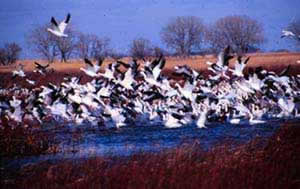Diagnosing and Controlling Wildlife Disease

The National Wildlife Health Center provides technical assistance and
leadership for addressing health issues involving wildlife resources
under Department of Interior steward ship and fosters partner ships
with others to address wildlife health as a component of ecosystem
health.
Dense aggregations of snow geese increase the risk of disease transmission
During the past quarter-century
the emergence of new diseases afflicting humans and the re-emergence of
previously conquered diseases have become an international focus for concern
and action. Wildlife populations are also afflicted by new and re-emerging
diseases and the National Wildlife Health Center, a component of the U.S.
Geological Survey located in Madison, Wisconsin, was established to address
the health and disease issues of free-ranging wildlife.
Specialized biological
containment facilities USGS to investigate highly infectious diseases
affecting a broad spectrum of wildlife such as amphibians, eagles, sea
turtles, sea otters, migratory birds, wolves, large mammals, and other
species.
Investigations are carried out by a multi-disciplinary team of more than
70 scientists and support personnel who are specialists in such fields
as wildlife ecology, epidemiology, veterinary medicine, pathology, virology,
bacteriology, parasitology, chemistry, biometry, population ecology. The
Center provides a multi-disciplinary, integrated program of disease diagnosis,
field response, research, and training.
The Center international
focal point for research, information, and scholarly exchange on scientific
matters involving the study of wildlife health and disease.USGS is also
working to better understand the ecological relationships between free-ranging
wildlife, domestic animals, and public health concerns involving zoonotic
diseases.
The gregarious habits
of many wildlife species can enhance their susceptibility to catastrophic
losses from diseases such as avian botulism and pesticide poisoning, and
infectious diseases that can rapidly spread through a population. The
mobility of wildlife enhances the potential for infectious disease to
quickly spread to new locations and populations, Timely and accurate diagnosis
of wildlife illness and mortality is critical to achieving effective disease
control and prevention.
Center research focuses
on understanding the ecology of disease in order to identify the most
vulnerable linkages between affected species (the host), the disease agent,
and environmental factors resulting in disease. This understanding is
fundamental for developing effective disease prevention and control strategies.
Center investigators also evaluate the impact of disease on wildlife population
dynamics, model environmental factors influencing disease outbreaks, and
explore the pathogenesis of disease agents in susceptibile hosts. Other
Center research is directed towards developing enhances technology for
disease detection and diagnosis and developing biologics to protect animals
against infection.
|